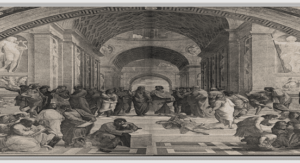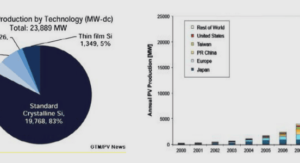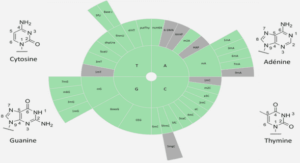The Land and the People
A Survey of the Land and the People 10 Man‟s relationship with his environment had always been one of the major themes of some English novelists. To understand the relationship between the land and the people, the concepts need to be defined. The most important concepts are Land and People. As to give a good definition of the concept, the following questions are going to be answered: what does the land mean? What is the meaning of People? And see if those definitions do not differ from the concept given by our subject. So as to answer these questions, some dictionaries can be referred to. According to the Dictionary.com: Land7 (noun) is: 1 Any part of the earth‟s surface not covered by a body of water ; the part of the earth‟s surface occupied by continents and islands; 2 An area of ground with reference to its nature or composition. 3 Rural or farming areas, as contrasted with urban areas 4 Law a) Any part of the earth‟s surface that can be owned as property, and everything annexed to it, whether by nature or by the human hand. b) Any legal interest held in land 5 Economics Natural resources 6 A part of the earth marked off by natural or political boundaries or the like; a region or country. As for the same dictionary the word: People8 is: 1 Persons indefinitely or collectively; persons in general. Persons, whether men, women, or children, considered as numerable individuals forming a group. 3 Human being, as distinguished from animals or other beings. The previous definitions can give an idea on both the land and the people which are not totally different from the concept given in this topic. Besides this physical or superficial definition, the topic put the emphasis on the diplomatic aspect which exists in Africa. Thus, in it, the land can be defined as the African continent and the people refer to European exploiters of the continent resources, and the African people. So for the sake of the subject, it will be connected to British behaviors in Africa (setting of the novels) during colonial and neocolonial period focusing on the key words such as colonization, neo-colonialism, individualism and dehumanization. 12 1- The African Land Africa has a large quantity of natural resources, including diamonds, salt, gold, iron, cobalt, uranium, copper, bauxite, silver, petroleum and cocoa beans, but also woods and tropical fruits. Much of its natural resources are not yet exploited or, they are barely harnessed. While having a low human density during a long period of time, Africa has been colonized by foreigners. The real aim of these more dynamic groups is to exploit entirely African resources. Some economists have advocated the „scourge of raw materials’: large quantities of rare raw materials putting Africa under heavy pressures and tensions leading to wars. This Machiavelli enterprise will have a bad impact on the Africans‟ development. Despite this abundance of natural resources, some other economists suggest that many Western nations such as the United States, Canada, France and the United Kingdom, as well as some emerging economies such as China often exploit African natural resources. This fact is nowadays inherent to the important wealth they have got from the natural resources from the African soil. This will result with the economic development of the Western and Eastern Asia while making poorer and poorer the African countries. In the past, African economy laid on trade while they were using trade routes that were developed between cities and kingdoms. Some trade routes were paths; some others involved navigating rivers. Moreover, some of them were developed around port cities. Large African empires had become wealthy due to their trade networks, for instance, the Ancient Egypt, Nubia, Mali, Ashanti, and the Oyo Empire. Some parts of Africa had close trade relationships with Arab kingdoms. And, during the Ottoman Empire‟s era, a large number of Africans had been converted into the Islamic religion. In that period of time, a trade route through the Indian Ocean had been developed. That would bring the Portuguese as an imperial force in the Sub-Saharan Africa. The Colonial interests had created some new industries to feed European appetites for the sake of goods such as palm oil, rubber, cotton, precious metals, spices and other goods. 13 Most of European men thought that Africa had been a barbaric and uncivilized continent before they came there. They imagined it deeply rooted in poverty, ignorance, witchcraft, cannibalism and tribal wars, without even a history or a culture. Therefore, Africa was considered as a “Dark Continent”. African inhabitants had been said to have neither wheeled transport nor animal transport. And, they had neither roads nor towns. No tools except the small hand hoes, axes, wooden digging sticks, and so on. Furthermore in Africa, there were no manufactures, and no industrial products except some mere domestic handiwork products. No commerce as it is understood in the modern era existed in the African continent. There were no currencies. There were only exchanges of goods between people as far as the supply and demand are concerned. All these negative elements had been used to justify Africa as a “Dark Continent”. It is not only the continent that was believed to be primitive but, its inhabitants too. In addition to that, some other biases had affirmed that African people were most of the time naked or they merely wore the skin of wild animals that they had hunted to feed themselves. And, they were illiterate. They had even no means of writing; neither hieroglyphics nor of numbers except by counting with their fingers. They had no weights or measures in general use. Perhaps, as the most astonishing in the modern Europeans‟ mind was that Africans had neither calendar nor a notation of the time. They were pagan, and they believed in the spirits and in their ancestors‟ idolatrous legacy. Their mind was confined in the grip of magic, witchcraft and superstitions. To better understand the belief of Europeans, as far as the African continent was concerned, the history of that continent should be known. In the past, the history of Africa had begun with the emergence of Homo sapiens in East Africa, and continued into the present as a patchwork of diverse and politically developing nations and States. The recorded history of early civilization arose in Sudan, and later in the Ancient Egypt, the Sahel, Maghreb and the horn of Africa. In those areas, it could be seen how Africa had been the centre of rich and splendid civilizations, what most of Europeans had ignored before the first travelers arrived in Africa. African past was marked by the Ancient Egypt, a period where the river Nile was occupied in which a new form of government appeared in Egypt. It could be noticed the development of 14 agriculture, the apparition of polytheism and of pharaohs who had been at the head of the country. As symbols of the civilization of ancient Egypt there were also the pyramids of Giza, the development of the trade, and the setting up of institutions and culture. When Egypt‟s power began to decline in the 5th century B.C., the centre of power shifted southward to the city of Moroë in the present Sudan. That brought the civilization of Egypt even more deeply into the African continent. For more than seven centuries, the city flourished and became the centre of an industrial of iron area. Thus, a modern archaeologist described it as “the Birmingham of central Africa.” However, some centuries later, that powerful city fell down. And, it was followed with the control of the Mediterranean coast of Africa by the Romans whom had no attempt to conquer African communities in the South of Sahara despite the contact they had had with them. During the middle age, Islam spread to the West from Arabia to Egypt, crossing the Maghreb and the Sahel. From the mid-7th, the Arabs slave trade saw Muslim Arabs enslaved Africans. They exactly invaded Egypt in 639. By the beginning of the next century, they were masters of the North African coast. These Muslim conquerors were of enormous importance to Africa, for the cultural unity which Islam imposed on its conquered territories lasted for centuries. Muslim conquest brought order and peace. So, trade and learning flourished and men could travel without any fear. Among the first Arabs to visit Africa, and particularly, the South of Sahara, there were Al Bekri, Al Omari, and Ibn Battuta. Muslim invasions allowed discovering some powerful African states. In fact, in 1067, the Arab writer Al Bekri visited Ghana. His description shows just how the country was powerful, for the king could: ―Put two hundred thousand warriors in the field, more than forty thousand, being armed with bow and arrow. When he give an audience to his people, to listen to their complains and set them to rights, he sits in a pavilion around which stand ten pages holding shields and gold-mounted swords: and on his right hand are the sons of the princes of his empire, splendidly clad with gold plaited into their hair…the gate of the chamber is guarded by dogs of an excellent breed, who never live the king‘s 15 seat: they wear collars of gold and silver, ornamented with the same metals.
People in the African continent
At the beginning of the nineteenth century, the interior of Africa was still a region of mystery to the White man. European traders spent all their times in their coastal forts and depended on Africans and Arabs to supply them with merchandise from the interior. After the disastrous consequences of the slave trade, they had no interest to visit inland. But with the beginning of the industrial revolution of the nineteenth century a change in their relationship would be possible. They needed raw materials which were in Africa for their factories. Then, they began to explore Africa but faced many dangers. The great period of exploration started with the journey of Robert Bruce to Ethiopia in 1769, and ended with the European partition of Africa in the 1880s. The interior of Africa was an inhospitable region for White men, and they faced terrifying obstacles in their efforts to penetrate it. Among dangers they faced, it can be enumerated the African weather. Europeans suffered a lot because of an intense heat; they were not accustomed to such weather and the presence of mosquitoes. The lack of routes inland also could be noticed. They were obliged to use palanquins on the shoulders of the bearers to cross the continent. European people were affected by a variety of tropical diseases against which they had little resistance; they were astonished that how malaria could quickly affected a man. Then, they needed medicines to treat this accustomed diseases. They were obliged to try native cures which sometimes seemed worth than the disease itself. Another danger was dangerous wild animals that attacked the explorers. African chiefs were also likely to cause difficulties, it was essential to obtain their cooperation. As a process, when a White man wanted to visit an area, he had first to send a messenger to announce his coming and ask permission to the chief to be allowed to go wherever he wanted with his people. Despite facing all those dangers, Europeans continued to explore the continent. The Christian zeal to convert Africans was a strong stimulus to Europeans. Although excitement and desire for adventure spurred many explorers, the real prize was the joy and exhalation of being the first White man to set foot in unknown places. They struggled with sickness, starvation, and the fatigue in order to accomplish their mission. If not, they preferred to die rather than 21 returning home being defeated. That was the reason why English were very happy when they had found the sources of the Nile. For them, this was the reward of their labor for years of tenacity through Africa. A century later, Bruce had reached Ethiopia. Europeans solved almost the great geographical problems of Africa. They stood at the White and Blue Niles. The Niger and Congo Rivers had been navigated. The interior of Africa was no longer a mystery land for Europeans. As they had known African people and seen their way of life, they considered themselves as their superior. Most of explorers assumed that the natural relationship between Europeans and Africans was as that of a master and his servant. They had come to believe that they were members of a superior species; it was their duty to assert and maintain that position from then on. So, dignity was essential and they would not go to lose it by sitting on the ground as Africans used to it. By considering himself as a master, a White man did not hesitated to use violence if an African servant or bearer was disobedient. Most of explorers, particularly Victorians, thought that Africa was without a history. They knew nothing of the splendors of the African past. For them, the Central Africa was a savage country in which they found no vestiges of the past. And, the race of men who inhabited it was unchanged from the prehistoric tribes. Europeans then decided to enter and conquer the African continent. Explorers‟ activities and results of their work made Europeans turned their attention toward the African continent. Then, they wanted to conquer and rule the African territory. However, some small areas were already under the Whites‟ control. As early as 1652, some Dutch immigrants settled in the South. In the eighteen-thirties and forties, French armies had conquered a part of the North Africa. The British and Portuguese controlled small enclaves of territories near the coast. Europeans‟ need to conquer Africa was caused by changes occurring in Europe since the end of the eighteenth century. By the 1880s, the whole of Europe had become or was becoming industrialized. Competition for markets, raw materials and fields of investment made the expansion necessary. Yet, it was impossible for any State to expand in Europe itself without provoking a war. The solution was to find colonies quickly as far as they were able to do it. Their real aim was to increase the power of their countries either on the land or in the sea. 22 Therefore, they needed Africans‟ collaboration because they faced an economic crisis. In fact, with the industrial revolution, the whole Europe was industrialized. Europeans produced a lot of products but they had a lack of consumers. Beside the need for raw materials, Europe wanted to solve an immense and difficult problem which was the basis of the industrial life, the very condition of existence. That was the question of an available market to sell all its products. The Europeans‟ goal was to raise new masses of consumers in other parts of the globe. As far as British were concerned, they were convinced that Britain could not exist without overseas possessions. However, for the other European countries, colonization was a question of life and death. But, economic reasons were not the only ones for expansion. Most of Europeans were influenced by the idea of Charles Darwin whom suggested that nations must struggle for survival in order to assert their superiority. As they were wise, Europeans did not want that lead them to wars. That is why they obtained their colonies by negotiating or by great International conference such as the conference of Berlin. African people tried to resist for the first time but they did not succeed in. They lacked of means; their weapons were not sophisticated enough. Even if there was a little hope of success in their resistance, certain powerful tribe decided to face Europeans. Among them there were the Ashanti and the Zulu. Those tribes put up a brave resistance but stood no chance against modern weapons. Despite negotiations and conferences which allowed the settlement of some areas, British and Boers went to war. In fact they discovered diamond and gold in South Africa. Those discoveries would affect the whole future of the country. They spent many years fighting before signing a treaty of peace. The speed of the conquest and the weakness of African resistance made most of Europeans to have the right to rule African countries. That fact is called the colonization. That was a long period in which European people lead their colonies. They found that colonies were important because it allowed to feed Europeans, to take of the surplus population, to spread their culture and their civilization, to sell their products… 23 European presence in Africa was one of interest meaning that it was just based on the exploitation of its wealth. And did African people profit from the colonization of Africa? That was a question whose answer would help to have a true view of the relationship between people in Africa. The colonization put an end to the tribal wars and to the slave-trade that existed between African before European coming. In other words, they brought peace in Africa and between African people. They had also created roads, and railroads; they saved African from starvation and certain diseases. Europeans taught them how to lead their own affair with justice and humanity and educated them in letter and in industry. European countries sent missionaries in Africa to get them out of their primitive life by giving them their religion. Apart these changes African people lived during years under European domination. They were totally ignorant of what happen in their continent. They only followed the European without taking any decisions. They were in a period where Africa laid under European domination. By civilizing African, European educated them. That meant they built schools where they were sent in order to learn how to read and write. And also taught them how to count and analyze things; that is to say how to use their brains. Unfortunately they did not know that education could help African to be aware of the situation in which they were. Many of African continued their study abroad to be train as real European. That was those men who created groups of educated African to struggle to free Africa from European domination. Next to African intellectual, there are African soldiers who were at the two world wars. After their returning back home they realized that Europeans were not demy gods as they fought. After being in contact with them, it allowed Africans to be conscious of their life conditions. Besides this consciousness the effect of technology in Africa could be mentioned. The development of modern technical invention in African lives like means of communication had helped them a lot. Means of communication had broken the isolation and speed up the operation of change.
DEDICATION |





